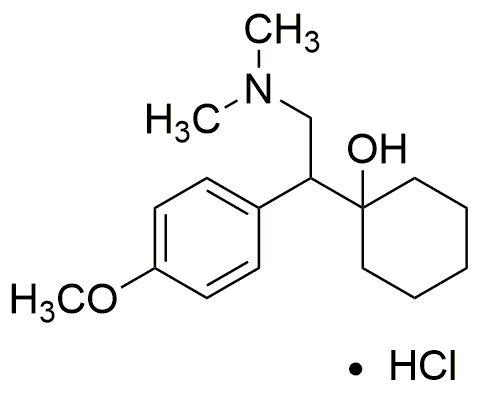Venlafaxine hydrochloride is widely utilized in research focused on:
- Depression Treatment: Commonly prescribed for major depressive disorder, it helps improve mood and emotional well-being, providing relief for patients who may not respond to other antidepressants.
- Anxiety Disorders: Effective in managing generalized anxiety disorder, it aids in reducing excessive worry and anxiety, making it a valuable option for mental health professionals.
- Pain Management: Research indicates its potential in treating chronic pain conditions, such as fibromyalgia, by affecting neurotransmitter levels that influence pain perception.
- Neuropathic Pain: Utilized in clinical settings for patients with diabetic neuropathy, it helps alleviate nerve pain, offering a dual benefit for those with both depression and chronic pain.
- Pharmaceutical Research: Frequently studied in clinical trials to explore its efficacy and safety profile, aiding in the development of new therapeutic strategies for mental health disorders.
Informations générales
Propriétés
Sécurité et réglementation
Applications
Venlafaxine hydrochloride is widely utilized in research focused on:
- Depression Treatment: Commonly prescribed for major depressive disorder, it helps improve mood and emotional well-being, providing relief for patients who may not respond to other antidepressants.
- Anxiety Disorders: Effective in managing generalized anxiety disorder, it aids in reducing excessive worry and anxiety, making it a valuable option for mental health professionals.
- Pain Management: Research indicates its potential in treating chronic pain conditions, such as fibromyalgia, by affecting neurotransmitter levels that influence pain perception.
- Neuropathic Pain: Utilized in clinical settings for patients with diabetic neuropathy, it helps alleviate nerve pain, offering a dual benefit for those with both depression and chronic pain.
- Pharmaceutical Research: Frequently studied in clinical trials to explore its efficacy and safety profile, aiding in the development of new therapeutic strategies for mental health disorders.
Documents
Fiches de données de sécurité (FDS)
La FDS fournit des informations de sécurité complètes sur la manipulation, le stockage et l’élimination du produit.
Spécifications du produit (PS)
Le PS fournit une description complète des propriétés du produit, notamment sa composition chimique, son état physique, sa pureté et les exigences de stockage. Il détaille également les plages de qualité acceptables et les applications prévues du produit.
Certificats d'analyse (COA)
Recherchez des certificats d'analyse (COA) en saisissant le numéro de lot du produit. Les numéros de lot et de lot se trouvent sur l'étiquette d'un produit, après les mots « Lot » ou « Lot de fabrication ».
Numéro de catalogue
Numéro de lot/série
Certificats d'origine (COO)
Ce certificat d'exploitation confirme le pays dans lequel le produit a été fabriqué, et détaille également les matériaux et composants utilisés et s'il est issu de sources naturelles, synthétiques ou autres sources spécifiques. Ce certificat peut être requis pour les douanes, le commerce et la conformité réglementaire.
Numéro de catalogue
Numéro de lot/série
Fiches de données de sécurité (FDS)
La FDS fournit des informations de sécurité complètes sur la manipulation, le stockage et l’élimination du produit.
DownloadSpécifications du produit (PS)
Le PS fournit une description complète des propriétés du produit, notamment sa composition chimique, son état physique, sa pureté et les exigences de stockage. Il détaille également les plages de qualité acceptables et les applications prévues du produit.
DownloadCertificats d'analyse (COA)
Recherchez des certificats d'analyse (COA) en saisissant le numéro de lot du produit. Les numéros de lot et de lot se trouvent sur l'étiquette d'un produit, après les mots « Lot » ou « Lot de fabrication ».
Numéro de catalogue
Numéro de lot/série
Certificats d'origine (COO)
Ce certificat d'exploitation confirme le pays dans lequel le produit a été fabriqué, et détaille également les matériaux et composants utilisés et s'il est issu de sources naturelles, synthétiques ou autres sources spécifiques. Ce certificat peut être requis pour les douanes, le commerce et la conformité réglementaire.


